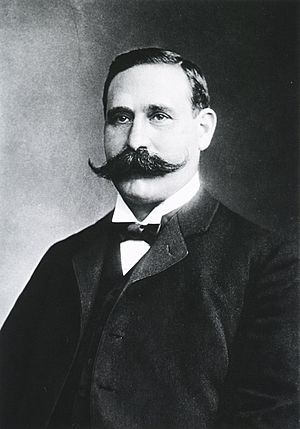Albert Hoffa facts for kids
Quick facts for kids
Albert Hoffa
|
|
|---|---|
 |
|
| Born | 31 March 1859 |
| Died | 31 December 1907 |
| Education |
|
Albert Hoffa (born March 31, 1859 – died December 31, 1907) was an important German doctor. He was a surgeon, which means he performed operations. He was also an orthopedist, a doctor who treats bone and muscle problems. Plus, he was a physiotherapist, helping people recover movement and strength. Hoffa was born in Richmond, a place in what is now South Africa.
Contents
Albert Hoffa's Life and Work
Albert Hoffa studied medicine at two universities in Germany: Marburg and Freiburg. After finishing his studies, he opened his own clinic in Würzburg in 1886. This clinic focused on fixing bone and muscle issues, helping people with physical therapy, and using massage.
Later, in 1895, he became a professor at the University of Würzburg. This meant he taught medical students. In 1902, he moved to Berlin to lead the orthopedics department there.
What Albert Hoffa is Known For
Albert Hoffa made several important contributions to medicine.
Helping Babies with Hip Problems
In 1890, he created a special surgery for babies born with hip dislocations. This is a condition where the hip joint is not properly in place from birth. His operation helped many children.
The Hoffa System of Massage
He also developed a special way of using massage therapy. This system, sometimes called the "Hoffa system," helped patients recover from injuries and improve their movement.
Hoffa's Fat Pad Disease
You might hear his name linked to a condition called "Hoffa's fat pad disease." This problem causes ongoing knee pain. It happens when a small pad of fat under the patella (your kneecap) gets irritated or inflamed.
Starting a Medical Journal
In 1892, Albert Hoffa started a medical journal. It was called Zeitschrift für orthopädische Chirurgie. A journal is like a special magazine where doctors and scientists share their new discoveries and research.
Selected Writings
Albert Hoffa wrote many books and articles to share his knowledge. Here are a few of them:
- Lehrbuch der Fracturen und Luxationen für Ärzte und Studierende, 1888 – This was a textbook about broken bones and luxations (dislocations) for doctors and students.
- Lehrbuch der orthopädischen Chirurgie, 1891 – A textbook about orthopedic surgery.
- Technik der Massage, 1893 – This book explained his techniques for massage.
- Atlas und Grundriss der Verbandlehre, 1897 – A guide about how to apply bandages.
Images for kids
See also
 In Spanish: Albert Hoffa para niños
In Spanish: Albert Hoffa para niños
- Hoffa fracture
- Busch-Hoffa fracture
 | James Van Der Zee |
 | Alma Thomas |
 | Ellis Wilson |
 | Margaret Taylor-Burroughs |


